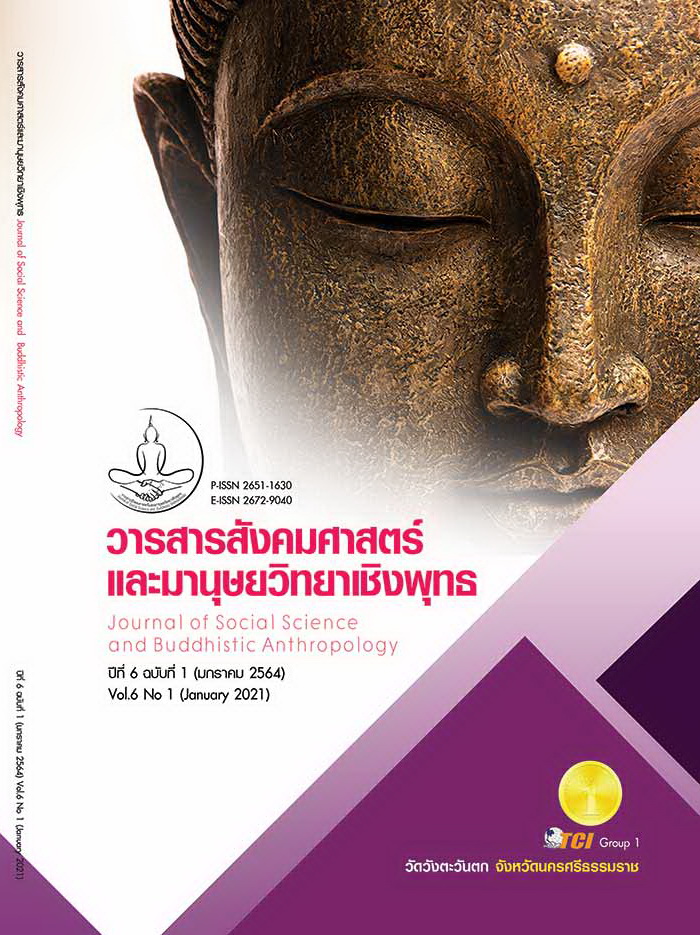THE INTEGRATION OF POSTMODERN AND BUDDHIST PHILOSOPHY IN SONGKHLA LAKE BASIN DEVELOPMENT
Keywords:
Integration, Postmodern Philosophy, Buddhist Philosophy, Songkhla Lake Basin DevelopmentAbstract
The objectives of this research article were to 1) study the concepts concerning the Songkhla Lake Basin development, 2) study the Postmodern and Buddhist philosophy on Development, 3) integrate post-modern and Buddhist philosophy in the development of the Songkhla Lake. This research was a qualitative research focus on document and field study. The sample consisted of 17 persons. The presentation was by the analytical description upon the analytic, appreciative and applicative approach so as to lead to the creativity of new body of knowledge in philosophy and religion. The results of the research were found as follows: The concepts of Songkhla Lake Basin Development, it is found that the Songkhla Lake Basin Development under the 3 dimensions of development which are 1) Human and Social dimension 2) Tourism and Economy dimension 3) Environment conservation dimension, by bringing the concepts of postmodern and Buddhist philosophy on development contains postmodern philosophical ideas of Michel Foucault on marketing technology that cover the concept of technology of desire, the technology of identity, the technology of the self and Buddhist metaphysics (Khan 5) on human development, namely body and mind, Buddhist epistemology (wisdom 2) on wisdom at two levels, namely mundane wisdom and super-mundane wisdom, Buddhist ethics in 3 levels which are basic level, middle level, and high level, including Buddhist ethics (Bala 4) on principles which are power to be used as a tool for development in an integrated development of the Songkhla Lake Basin in order to correct the weaknesses and obstacles arising under such three-dimensional development for peaceful living. The new body of knowledge from this research is IPL Model: L + BVW -> PL.
References
คณะกรรมาธิการทรัพยากรธรรมชาติและสิ่งแวดล้อม สภานิติบัญญัติแห่งชาติ. (2559). วิกฤติทะเลสาบสงขลาสู่การพัฒนาที่ยั่งยืน. ใน รายงานคณะกรรมาธิการสามัญ. กลุ่มงานการพิมพ์ สำนักการพิมพ์สำนักงานเลขาธิการวุฒิสภา.
เชิดชัย อ๋องสกุล และคำนวณ นวลสนอง. (2559). การท่องดเที่ยวเชิงวัฒนธรรมพื้นที่ลุ่มน้ำทะเลสาบสงขลาเพื่อการพัฒนาที่ยั่งยืน. ใน รายงานการวิจัย. สถาบันทักษิณคดีศึกษา มหาวิทยาลัยทักษิณ.
เดชา บุญมาสุข. (2558). การบูรณาการหลักพุทธธรรมเพื่อพัฒนาคุณภาพชีวิตที่ยั่งยืน. ใน ดุษฎีนิพนธ์พุทธศาสตรดุษฎีบัณฑิต สาขาวิชาพระพุทธศาสนา. มหาวิทยาลัยมหาจุฬาลงกรณราชวิทยาลัย.
นิเวศน์ พูนสุขเจริญ. (2561). แนวทางการพัฒนาเมืองยั่งยืนในมิติพระพุทธศาสนา: กรณีศึกษาเมืองเชียงใหม่. ใน ดุษฎีนิพนธ์พุทธศาสตรดุษฎีบัณฑิต สาขาวิชาพระพุทธศาสนา. มหาวิทยาลัยมหาจุฬาลงกรณราชวิทยาลัย.
ปรัชญา ธัญญาดี. (2547). บทบาทสื่อมวลชนท้องถิ่นกับโครงการพัฒนาลุ่มน้ำทะเลสาบสงขลา สื่อมวลชนสัญจรลุ่มน้ำทะเลสาบสงขลา 2547. กรุงเทพมกหานคร: คณะทำงานประชาสัมพันธ์ลุ่มน้ำทะเลสาบสงขลา.
พรศักดิ์ พรหมแก้ว และจรินทร์ เทพสงเคราะห์. (2555). การจัดการความรู้บนฐานทุนสังคมและวัฒนธรรมของชุมชนเพื่อการพัฒนาคุณภาพชีวิตอย่างยั่งยืนในพื้นที่ลุ่มน้ำทะเลสาบสงขลา. ใน รายงานการวิจัย. มหาวิทยาลัยทักษิณ.
พระพรหมคุณาภรณ์ (ป.อ. ปยุตฺโต). (2552). การพัฒนาที่ยั่งยืน. (พิมพ์ครั้งที่ 10). กรุงเทพมหานคร: สำนักพิมพ์สหธรรมิก.
พระมหาโยธิน โยธิโก (ปัดชาสี). (2561). การจัดการขันธ์ 5 เพื่อแก้ปัญหาและพัฒนามนุษย์ในพระพุทธศาสนา. ใน ดุษฎีนิพนธ์พุทธศาสตรดุษฎีบัณฑิต สาขาวิชาพระพุทธศาสนา. มหาวิทยาลัยมหาจุฬาลงกรณราชวิทยาลัย.
วิชัย เทียนน้อย. (2542). การจัดการทรัพยากรธรรมชาติ. (พิมพ์ครั้งที่ 4). กรุงเทพมหานคร: อักษรวัฒนา.
สำนักงานคณะกรรมการพัฒนาการเศรษฐกิจและสังคมแห่งชาติ. (2559). สรุปสาระสำคัญแผนพัฒนาเศรษฐกิจและสังคมแหงชาติ ฉบับที่ 12 (พ.ศ. 2560 - 2564). กรุงเทพมหานคร: สำนักงานคณะกรรมการพัฒนาการเศรษฐกิจและสังคมแห่งชาติ สำนักนายกรัฐมนตรี.
สิทธิโชค ปาณะศรี. (2558). การธำรงอัตลักษณ์ในสังคมพหุวัฒนธรรมมองผ่านแนวคิดปรัชญาหลังนวยุคของมิเชล ฟูโกต์: กรณีศึกษาภิกษุสยาม รัฐเกดะห์ ประเทศมาเลเซีย. ใน ดุษฎีนิพนธ์ปรัชญาดุษฎีบัณฑิต สาขาวิชาปรัชญาและศาสนา. มหาวิทยาลัยเซนต์จอห์น.
อภิภา ปรัชญพฤทธิ์. (2554). หลังสมัยใหม่นิยมและการอุดมศึกษา. กรุงเทพมหานคร: สำนักพิมพ์อินทภาษ.
เอกราช มะลิวรรณ์. (2556). การพัฒนาทะเลสาบสงขลาเพื่อนำไปสู่การพัฒนาที่ยั่งยืน: ศึกษาเฉพาะพื้นที่อำเภอเมือง จังหวัดสงขลา. ใน วิทยานิพนธ์รัฐศาสตรมหาบัณฑิต สาขาวิชารัฐศาสตร์. มหาวิทยาลัยรามคำแหง.









